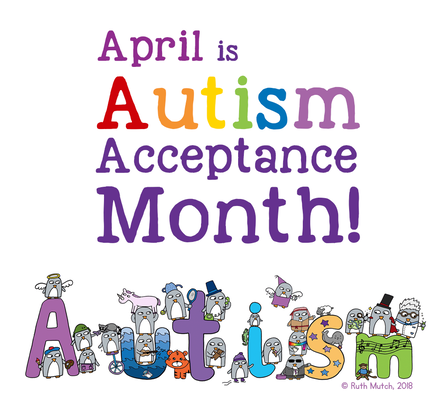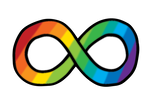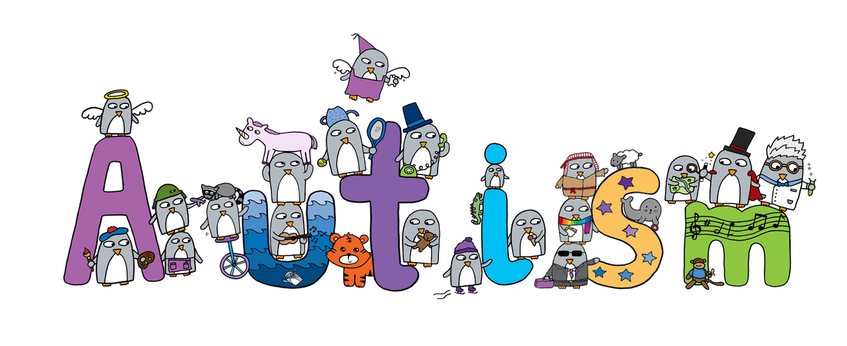What is Autism?

Autism is a neurodevelopmental condition. It is a vast spectrum that includes people who are extremely intelligent, who may have masters degrees, their own families and high level occupations - as well as those who may need round-the-clock care and specialist support. Plus everything in between!
The autistic 'spectrum' is not a straight line from 'mild' to 'severe'. In fact it's more like a constellation of stars in the sky - with people's abilities and difficulties scattered all over the place! Every autistic person is different - some may have high care needs, while others may live a relatively independent life with the right support.
Autism is not a learning disability (intellectual disability outside of the UK) or a mental health condition. But autistic people can have a learning disability and/or mental health difficulties in addition to their autism.
Autism consists of difficulties in:
- Social Interaction
- Social Communication
- Repetitive and Restricted Interests (also called "social imagination")
The important word is "social". Autism is a social communication condition, which makes it harder to interact, communicate and form relationships with other people.
As well as the main difficulties, it is estimated 90% of autistic people also have sensory processing differences. These can include hypersensitive hearing, aversion to bright lights, dislike of certain foods/tastes/textures, sensitivity to touch, difficulty with body awareness (proprioception) and balance, and differences in how they feel temperature and pain. Differences/sensitivities can vary across the same sense. For example someone touching me lightly feels like my skin is burning... but I love deep pressure and bear hugs!
The autistic 'spectrum' is not a straight line from 'mild' to 'severe'. In fact it's more like a constellation of stars in the sky - with people's abilities and difficulties scattered all over the place! Every autistic person is different - some may have high care needs, while others may live a relatively independent life with the right support.
Autism is not a learning disability (intellectual disability outside of the UK) or a mental health condition. But autistic people can have a learning disability and/or mental health difficulties in addition to their autism.
Autism consists of difficulties in:
- Social Interaction
- Social Communication
- Repetitive and Restricted Interests (also called "social imagination")
The important word is "social". Autism is a social communication condition, which makes it harder to interact, communicate and form relationships with other people.
As well as the main difficulties, it is estimated 90% of autistic people also have sensory processing differences. These can include hypersensitive hearing, aversion to bright lights, dislike of certain foods/tastes/textures, sensitivity to touch, difficulty with body awareness (proprioception) and balance, and differences in how they feel temperature and pain. Differences/sensitivities can vary across the same sense. For example someone touching me lightly feels like my skin is burning... but I love deep pressure and bear hugs!
How does autism affect me?
At first glance, it might not seem like being autistic affects me very much. I might appear fine when I'm in a familiar situation, with people I know well - but that doesn't mean I'm not struggling.
I wasn't diagnosed as autistic until I was 21. I have always been incredibly shy, quiet and passive - and added to being female, this meant that I was overlooked as a child. I didn't cause any problems, was well behaved at school and managed to achieve reasonable grades. I was constantly told to 'just try harder' or 'be more assertive' and learnt to hide my feelings and anxiety.
This sort of fell apart when I went to university, and after a lot of drama, misdiagnoses and assessments, I was finally diagnosed as autistic. It was a huge relief to know I hadn't been imagining it, and that there was a reason why I found certain things so difficult.
My autism mainly affects my verbal communication, how I interact with other people, what my hobbies and interests are, and the way my senses work.
Communication and Interaction
I'm often told that I am extremely articulate in writing. Probably because it has always been my preferred form of communication! I find speaking much more difficult. Usually I am okay in familiar situations, with people I know - but when I am anxious, something has changed or is unfamiliar my ability to speak is often one of the first things to be affected. This can lead to me being mute and unable to speak at all. Which can be pretty frustrating!
Special Interests
Although my interests (some of them at least!) may not be weird or unusual, being autistic means that they are often more specialised and/or intense. These "special interests" have changed as I've grown up. I have some interests for years, while others I might focus on intensely for a few weeks or months and then suddenly move onto something else!
At the moment my special interests are:
- Penguins (obviously!)
- PG Tips monkey
- TV shows (Stargate, Buffy, Angel, Charmed, The X-files, Firefly)
- Wheelchair tennis
I wasn't diagnosed as autistic until I was 21. I have always been incredibly shy, quiet and passive - and added to being female, this meant that I was overlooked as a child. I didn't cause any problems, was well behaved at school and managed to achieve reasonable grades. I was constantly told to 'just try harder' or 'be more assertive' and learnt to hide my feelings and anxiety.
This sort of fell apart when I went to university, and after a lot of drama, misdiagnoses and assessments, I was finally diagnosed as autistic. It was a huge relief to know I hadn't been imagining it, and that there was a reason why I found certain things so difficult.
My autism mainly affects my verbal communication, how I interact with other people, what my hobbies and interests are, and the way my senses work.
Communication and Interaction
I'm often told that I am extremely articulate in writing. Probably because it has always been my preferred form of communication! I find speaking much more difficult. Usually I am okay in familiar situations, with people I know - but when I am anxious, something has changed or is unfamiliar my ability to speak is often one of the first things to be affected. This can lead to me being mute and unable to speak at all. Which can be pretty frustrating!
Special Interests
Although my interests (some of them at least!) may not be weird or unusual, being autistic means that they are often more specialised and/or intense. These "special interests" have changed as I've grown up. I have some interests for years, while others I might focus on intensely for a few weeks or months and then suddenly move onto something else!
At the moment my special interests are:
- Penguins (obviously!)
- PG Tips monkey
- TV shows (Stargate, Buffy, Angel, Charmed, The X-files, Firefly)
- Wheelchair tennis
Interesting information
Identity First Language
Some people might have noticed that I use the word "autistic" to refer to myself. This is because I - like a majority of the autistic community - prefer 'Identity First Language' (IFL). By using IFL, we are acknowledging that being autistic is an integral part of us, something that can't be separated. The word 'autistic' isn't negative or bad - it's simply what we are!
Many allistic (non-autistic) people are taught that the 'correct' thing to do is use 'Person First Language' (PFL). For example, they would say 'person with autism' instead of 'autistic person'. They are taught this is 'because we're people first'. Unfortunately this tends to reinforce that autism is something that can be separated from us, something we just carry around with us - and that could be removed or 'cured' without changing who we are as people. Which is simply not true. We shouldn't need PFL to remind anyone that autistic people are still people. Please respect the wishes of autistic people and refer to us how we prefer! (If in doubt, ask!)
Neurodiversity Symbol
Traditionally autism has been associated with the symbol of the puzzle piece. There's many reasons why this can be problematic (implying we are puzzles, something to be solved, missing pieces etc) - as well as the fact that the main charity associated with the puzzle piece symbol is very harmful to autistic people.
If you're looking for a better symbol, then a lot of the community prefer the neurodiversity symbol, which is a rainbow infinity symbol. There's also an autism-specific version, which is a gold infinity symbol (the chemical symbol for gold is Au). Both of these symbols are much better alternatives to the puzzle piece!
Some people might have noticed that I use the word "autistic" to refer to myself. This is because I - like a majority of the autistic community - prefer 'Identity First Language' (IFL). By using IFL, we are acknowledging that being autistic is an integral part of us, something that can't be separated. The word 'autistic' isn't negative or bad - it's simply what we are!
Many allistic (non-autistic) people are taught that the 'correct' thing to do is use 'Person First Language' (PFL). For example, they would say 'person with autism' instead of 'autistic person'. They are taught this is 'because we're people first'. Unfortunately this tends to reinforce that autism is something that can be separated from us, something we just carry around with us - and that could be removed or 'cured' without changing who we are as people. Which is simply not true. We shouldn't need PFL to remind anyone that autistic people are still people. Please respect the wishes of autistic people and refer to us how we prefer! (If in doubt, ask!)
Neurodiversity Symbol
Traditionally autism has been associated with the symbol of the puzzle piece. There's many reasons why this can be problematic (implying we are puzzles, something to be solved, missing pieces etc) - as well as the fact that the main charity associated with the puzzle piece symbol is very harmful to autistic people.
If you're looking for a better symbol, then a lot of the community prefer the neurodiversity symbol, which is a rainbow infinity symbol. There's also an autism-specific version, which is a gold infinity symbol (the chemical symbol for gold is Au). Both of these symbols are much better alternatives to the puzzle piece!

